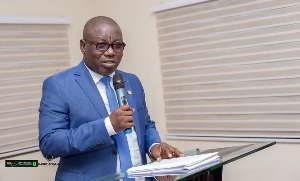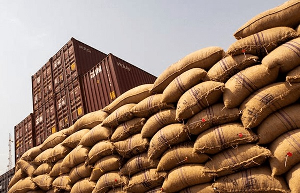ACCRA, Feb 22 (Reuters) - The 1998 GDP growth rate of 4.6 percent forecast by the Ghanaian government in its 1999 budget looks too high, while the budget deficit of 6.3 percent of GDP looks way too low, opposition politicians and analysts said.
The parliamentary debate on the budget began on February 18 and is expected to take several weeks.
Opposition finance spokesman Kofi Apraku said the 1998 economic growth rate was probably between 2.5 and 3.0 percent.
``The provisional growth of 4.6 percent for 1998 is, according to the government, to a large extent based on the growth in agriculture of 5.3 percent, the highest in 15 years,'' Apraku said. ``What accounted for this miraculous performance? It was a year of drought and food shortages in several districts.''
Independent analysts made the same point.
``It does go against the grain of logic. I would not be surprised if these numbers were revised substantially downward,'' said Bartholomew Armah, a U.S. economist currently doing research for the Institute of Economic Affairs.
The drought severely reduced output at Ghana's main hydroelectric dam in the early months of 1998, obliging the government to ration power to both industry and households.
Deputy Finance Minister Mozes Asaga, who is defending the budget in parliament, told Reuters the figures were credible and, judging by the final quarter 1998 figures that he received last week, full year growth might even reach 4.8 percent.
``The agricultural sector is not made up of food crops only as the minority speaker seems to think. It is also made up of forestry and logging, which grew 22 percent, and cocoa, where growth of 11 percent was registered,'' Asaga said.
Apraku was highly sceptical about the 1998 budget deficit, which, at 6.3 percent of gross domestic product according to the government, is already well above the forecast 5.0 percent.
``There is evidence of a tremendous build-up of payment arrears especially in the infrastructural sector. It means that the deficit is understated,'' Apraku said.
Economists at the Centre for Political Analysis (CEPA), an independent think-tank, backed that point.
The 1999 budget is based on GDP growth of 5.5 percent, driven by a forecast of strong output in both industry and agriculture, which has equally raised eyebrows.
``The private sector would call for greater caution with the estimated growth in industry for 1999 (6.3 percent), because the previous energy deficiency has been followed by increased energy costs from higher tariffs,'' said the Private Enterprise Foundation (PEF), a business umbrella organisation.
The PEF said it was vital for interest rates to come down. Although the Bank of Ghana has made three sizeable cuts since September, these have only reduced the discount rate to 32 percent from 45 percent.
Armah, the visiting American, said there was no transparency in official data in Ghana. Ministers admitted to Reuters that the statistical service had deteriorated, although Asaga said it was ``not a question of transparency, but one of bureaucracy.''
``Getting data here is a mindboggling, very, very time-consuming and almost impossible task. There is a lack of credibility,'' Armah said.
General News of Tuesday, 23 February 1999
Source: --












